|
 Secure Site
Secure Site
|
 |
Archive for the 'Sleep Habits' Category
 Bedtime meditation No need to be mystified by meditation, says Steven Hartman, director of professional training at Kripalu Center for Yoga and Health. To ease into a practice, try this simple mantra-based technique. Set your Zen Timer with Bowl gong for five to 10 minutes right before bed.
1. Lying on your back, close your eyes and notice your breath.
2. As you inhale, focus on a soothing phrase, such as “I am safe and whole.” You can say it aloud or in your mind. When exhaling, silently repeat the mantra. The specific phrase isn’t that important, says Hartman; the mantra’s purpose is “to give your mind something simple to focus on.”
3. If your mind wanders, gently turn your attention back to your breath and back to the mantra.
Adapted from Body + Soul Magazine, April 2008
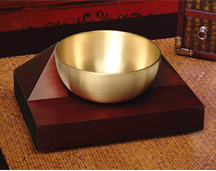 Zen Timer for Meditation with Singing Bowl
Now & Zen
1638 Pearl Street
Boulder, CO
Posted in Bamboo Chime Clocks, Chime Alarm Clocks, Meditation Timers, Meditation Tools, mindfulness practice, Natural Awakening, Now & Zen Alarm Clocks, Sleep Habits, Well-being
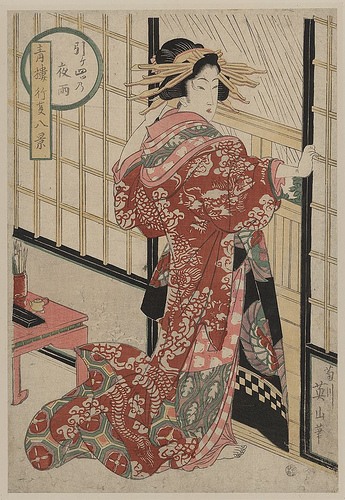 Wake up with gradual, beautiful acoustic chimes. The Zen Alarm Clock transforms your mornings and gets you started right, with a progressive awakening Dreams are more than just the mini-dramas of your sleeping mind.
Dr. Edward O’Malley, who studies sleep disorders at Norwalk Hospital in Connecticut, says dreaming helps us to process and even memorize information we have encountered throughout the day.
“Even though the situations may be bizarre, there’s a certain logic behind the dream,” he said.
Dreaming also helps to relieve stress and clear the cobwebs from our brains so that we wake up clear and alert.
According to O’Malley, dreams contain a surprising amount of very important content and meaning. He says we should pay close attention.
“While there are general archetype images in dreams like fire and water that mean generic things across the human species, there are very specific cues in your dreams that can give you information that can help you function in the daytime,” he said.
In fact, new research shows dreams help us to solve problems.
“If we have certain conflicts or problems that we may be trying to solve during the daytime,” said Dr. Eric Nofzinger of the University of Pittsburgh School of Medicine, “these problems become reactivated in dreams at nighttime and may get played through.”
Nofzinger’s dream research uses pet scans — an imaging technique — to view the brain’s activity during dream sleep. Remarkably, he has found that the brain’s same emotion centers that are active during the day become active when we dream. Some researchers believe that while we are dreaming, our brains are still working through the emotional conflicts of the day. It is one of the reasons that doctors tell patients to make sure they get enough sleep.
Decoding Dreams
There have been famous examples of people who have dreamed up solutions to problems, said Dr. Deirdre Barrett, a Harvard professor and author of “Trauma and Dreams.”
For example, dreams helped Otto Loewi conceptualize an experiment on a frog heart that later won him the Nobel Prize for medicine and biology. Friedrich August Kekule sorted out the structure of chemistry’s benzene ring in his dreams.
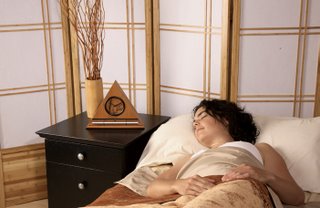 The Zen Alarm Clock's sweet acoustic chimes are truly a gourmet experience “People are going to dream whatever their background and qualifications, and it’s going to be major scientists who have the Nobel Prize-winning dreams,” she said.
She said that there were some steps people could take to focus their dreams in the right direction.
“The best steps are to write the problem down as a brief phrase of a sentence and have a pad and pen by the bed,” she said.
While you are falling asleep, Barrett said, think of the work that you have done so far in solving the problem and form an image to represent it.
“Artists say they like to set up a blank canvas at the other end of the room to suggest I’m looking for an image to paint,” she said.
Barrett suggested telling yourself you want to dream about the image as you are falling asleep.
“The last step, and this is really important, when you first wake up, stay still,” she said. “Don’t jump up and think about something else because recall for dreams is so fragile that you want to recapture it.”
Know What Is Bothering You
Barrett said that people could help determine the outcome of their anxiety dreams by trying to focus on finding a solution to what is troubling them.
“When you’re trying to solve this kind of open-ended problem, you don’t want to script the ending,” she said. “The whole point is to say I want a solution to X but you want to leave it open for your dreaming mind to come through with the solution.”
Boulder, Colorado—an innovative company has taken one of life’s most unpleasant experiences (being startled awake by your alarm clock early Monday morning), and transformed it into something to actually look forward to. “The Zen Alarm Clock,” uses soothing acoustic chimes that awaken users gently and gradually, making waking up a real pleasure.
Rather than an artificial recorded sound played through a speaker, the Zen Clock features an alloy chime bar similar to a wind chime. When the clock’s alarm is triggered, its chime produces a long-resonating, beautiful acoustic tone reminiscent of a temple gong. Then, as the ring tone gradually fades away, the clock remains silent until it automatically strikes again three minutes later. The frequency of the chime strikes gradually increase over ten-minutes, eventually striking every five seconds, so they are guaranteed to wake up even the heaviest sleeper. This gentle, ten-minute “progressive awakening” leaves users feeling less groggy, and even helps with dream recall.
What makes this gentle awakening experience so exquisite is the sound of the natural acoustic chime, which has been tuned to produce the same tones as the tuning forks used by musical therapists. According to the product’s inventor, Steve McIntosh, “once you experience this way of being gradually awakened with beautiful acoustic tones, no other alarm clock will ever do.”
adapted from abcnews.go.com
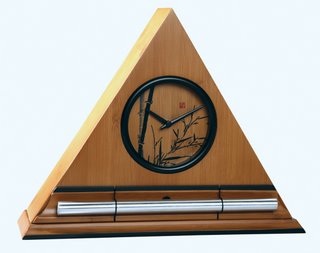 What makes this gentle awakening experience so exquisite is the sound of the natural acoustic chime
Now & Zen – The Zen Alarm Clock Store
1638 Pearl Street
Boulder, CO 80302
(800) 779-6383
orders@now-zen.com
Posted in Bamboo Chime Clocks, Dreams, sleep, Sleep Habits
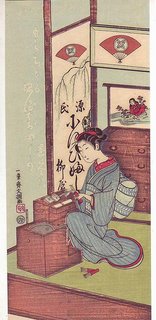 The Zen Alarm Clock transforms mornings, awakening you gradually with a series of gentle acoustic chimes Once you use a Zen Clock nothing else will do Do people choose what would make them happier? Would more money but with less sleep make you happier? A group of economists found that research participants chose what they thought would make them happier 83 percent of the time, with the majority choosing less sleep for a higher salary.
The group from Cornell University and the University of Michigan posed 13 scenarios to 2,699 people, including this question:
Say you have to decide between two new jobs. The jobs are exactly the same in almost every way, but have different work hours and pay different amounts.
Option 1: A job paying $80,000 per year. The hours for this job are reasonable, and you would be able to get about 7.5 hours of sleep on the average work night.
Option 2: A job paying $140,000 per year. However, this job requires you to go to work at unusual hours, and you would only be able to sleep around 6 hours on the average work night.
The paper, first reported by the Washington Post, studied three groups of people: 1,066 patients at a doctor’s waiting room in Denver, 1,000 adults across the country by telephone and 633 Cornell students. The American Economic Review will publish the paper.
Ori Heffetz, a Cornell economics professor who presents the paper at UCLA on Tuesday, said the most surprising finding for him was that “people’s choices seemed to coincide with their happiness predictions least frequently for what they thought were important life decisions.”
Among the respondents in Denver, 58 percent chose option one and also thought more sleep would make them happier, while 29 percent chose option two and said the higher salary would make them happier. However, 12 percent ranked option one (sleep) above option two (income) when asked what would make them happier; but they said they would most likely choose option two. Only one percent said they would choose sleep but thought they’d be happier with income.
Daniel Benjamin, economics professor at Cornell, said one of the most interesting study findings is there are systematic differences between what people think would make them happiest and what they would choose. Many researchers had believed it was obvious that people would choose what they think would make them happiest.
When asked which options they would choose, Heffetz said he would choose the higher salary because he typically needs less than six hours of sleep a night. Benjamin said it was a “tough” question, but he would choose the job that afforded more sleep.
“I don’t think I could survive on 6 hours of sleep at unusual hours,” he wrote in an email. “I need at least 8, preferably more.”
 Wake up with gradual, beautiful acoustic chimes. The Zen Alarm Clock transforms your mornings and gets you started right, with a progressive awakening Wake up refreshed, love your alarm clock, transform your mornings with The Zen Alarm Clock’s progressive awakening with gentle chimes.
The Digital Zen Clock’s long-resonating Tibetan bell-like chime makes waking up a beautiful experience – its progressive chimes begin your day with grace. When the clock’s alarm is triggered, the acoustic chime bar is struck just once … 3-1/2 minutes later it strikes again … chime strikes become more frequent over 10 minutes … eventually striking every 5 seconds until shut off. As they become more frequent, the gentle chimes will always wake you up – your body really doesn’t need to be awakened harshly, with a Zen Clock you’re awakened more gradually and thus more naturally. Unlike artificial recorded sounds coming out of a tiny speaker in a plastic box, natural acoustic sounds transform your bedroom or office environment.
adapted from abcnews.go.com by Suzanna Kim
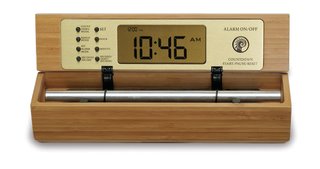 The Zen Alarm Clock transforms mornings, awakening you gradually with a series of gentle acoustic chimes Once you use a Zen Clock nothing else will do Now & Zen – The Soothing Alarm Clock Store
1638 Pearl Street
Boulder, CO 80302
(800) 779-6383
orders@now-zen.com
Posted in Bamboo Chime Clocks, Now & Zen Alarm Clocks, sleep, Sleep Habits
 Wake Up Slowly and Naturally with Zen Clocks - Kitagawa Utamaro A new poll on sleep habits suggests that millions of Americans are in a bad mood, short-tempered and prone to overeat because they are tired.
The National Sleep Foundation Poll, released today, finds that people say they’re much or somewhat more likely to make mistakes, get impatient or aggravated when waiting, or get upset with their children or others when they haven’t gotten enough sleep.
One fourth said they were more likely to eat more than usual on days when they didn’t get enough sleep, with slightly more women than men reporting this was common.
The poll establishes a link between how Americans sleep and “their overall behavior, mood and performance,” said Richard Gelula, the foundation’s executive director. “It shows ‘you are how you sleep.’ And it indicates that some of the problems that we face as a society, from road rage to obesity, may be linked to lack of sleep or poor sleep.”
The foundation, an independent, nonprofit organization researches sleep problems. It has conducted a poll on sleep habits each year since 1998, part of a springtime sleep-awareness campaign tied to the return of daylight- savings time, which begins Sunday.
The poll of 1,010 adults, taken between October and early December, found that nearly a quarter felt they weren’t getting the minimum amount of sleep they need to be alert the next day. Thirty-seven percent said they are so sleepy during the day that it interferes with their activities a few days each month; 16 percent said they experience this level of fatigue at least a few days a week.
Overall, sleep habits have remained fairly steady since the poll began, but the number of people reporting they sleep less than six hours a night both on weekdays and weekends rose slightly last fall, to 15 percent and 10 percent, respectively. On average, people say they are sleeping an average of 6.9 hours on weeknights and 7.5 hours on weekends.
Adults living in the West were more likely to get eight hours or more sleep on a workday than those living in the Midwest, South and Northeast.
 Once you experience the Zen Timepiece's progressive awakening, you'll never want to wake up any other way. Those who got fewer than six hours of sleep on weekdays were twice as likely to describe themselves as stressed or sad.
And people who reported often being sleepy during the day were considerably more likely than those who were never or rarely sleepy to describe themselves as dissatisfied with life (21 percent versus 7 percent) or angry (12 percent versus 4 percent).
More than half of those surveyed said they experience symptoms of insomnia a few nights a week or more; 37 percent said they snore frequently and 1 in 10 experiences pauses in breathing while sleeping.
The luxurious awakening provided by the Zen Alarm Clock is part of the growing preference for things natural—natural foods, natural fibers, and now, natural acoustic sounds. Like organic tomatoes in your salad, the organic sounds of the Zen Alarm Clock’s sweet acoustic chimes are truly a gourmet experience.
What makes this gentle awakening experience so exquisite is the sound of the natural acoustic chime, which has been tuned to produce the same tones as the tuning forks used by musical therapists. According to the product’s inventor, Steve McIntosh, “once you experience this way of being gradually awakened with beautiful acoustic tones, no other alarm clock will ever do.”
adapted from sfgate.com by Lee Bowman, Scripps Howard News Service
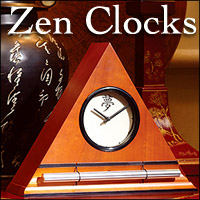 Why be Startled Awake -- Choose the Gentle Chime Alarm Clock for a Progressive Awakening Now & Zen – The Gentle Chime Alarm Clock Shop
1638 Pearl Street
Boulder, CO 80302
(800) 779-6383
Orders@now-zen.com
Posted in Bamboo Chime Clocks, Insomnia, sleep, Sleep Habits
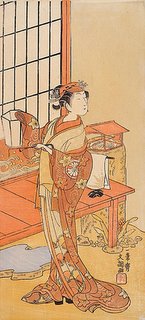 Can an alarm clock be bad for your health? According to Research by the National Institute of Industrial Health in Japan, despite the popularity of using an alarm clock, waking up to a jolting noise can be bad for your heart. Waking up abruptly can cause higher blood pressure and heart rate. Besides increasing your blood pressure, an alarm can add to your stress levels by getting your adrenaline rushing.
The solution to this health-harming problem is to instead try gradually waking up to natural light or to The Zen Alarm Clock which has soothing chime sounds. It may not be simple, but this replacement method sounds better than shrills from your alarm clock.
One of the ultimate Zen like experiences is waking-up from a great slumber refreshed and energized. Your mind and body are harmoniously one, both alert and focused. Having a refreshed mind and body are two keys to a natural and Zen lifestyle. Waking up in the morning should not be a loud and abrupt awakening, but rather it should be a peaceful positive experience. The right natural alarm clock can transition your deep and tranquil sleep into a serene start to consciousness. Imagine a long-resonating Tibetan bell-like chime waking you up to a beautiful morning experience.
The right alarm clock can be the most beneficial investment for you. With our Now & Zen natural alarm clock you are awakened more gradually and thus more naturally. Now & Zen is focused on creating a naturalistic lifestyle, and our clocks are an example of our philosophy.
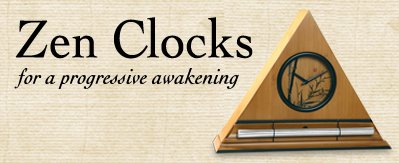 The Zen Alarm Clock transforms mornings, awakening you gradually with a series of gentle acoustic chimes Once you use a Zen Clock nothing else will do Now & Zen – The Soothing Alarm Clock Store
 The Calming Alarm Clock Store - Boulder, CO 1638 Pearl Street
Boulder, CO 80302
(800) 779-6383
orders@now-zen.com
Posted in Bamboo Chime Clocks, sleep, Sleep Habits
 Being Kept Awake - What to Do? Ukiyoe Hokusai It’s annoying enough to be kept awake by a music-blaring neighbor, but when it’s you who is sabotaging your own opportunity for rest, it really makes a girl want to scream…and cry from exhaustion.
Stress-induced insomnia is rampant these days among 20- and 30-something women. Thanks to job and money craziness, hectic social schedules, and the pressure to be totally together, the typical chick is more tense than ever, and that means she’s getting less sleep than her body needs, explains Joyce Walsleben, PhD, associate professor of medicine at the New York University School of Medicine and coauthor of A Woman’s Guide to Sleep.
Here, we explain how stress messes with your nocturnal schedule. Plus, we give tips to help you quiet your reeling brain and racing heart so you can get the R & R you need.
How Chronic Stress Screws Up Your System
It should be simple: You are tired and it’s bedtime, so you drift away within minutes of putting head to pillow. But when you’re stressed, things go haywire, and the exact opposite happens instead. Being even a little anxious can make your muscles tense, prompt your body to release the stress hormones cortisol and adrenaline, and elevate your heart rate.
You can feel these effects when you’re worried during the day. But at night, they have a stronger impact, overriding your ability to sleep or preventing you from staying asleep so you wake in the middle of the night, says Thomas Roth, PhD, director of the sleep center at the Henry Ford Hospital, in Detroit. Even if you do manage to snooze, stress will make the rest you get more fitful. Plus, you’ll spend more time in the lighter stages of sleep rather than in deeper slow-wave and REM sleep, which leaves you vulnerable to waking in the middle of the night, explains Barry Krakow, MD, medical director of the Maimonides Sleep Arts and Sciences, in Albuquerque, New Mexico, and author of Sound Sleep, Sound Mind.
Why Women Have It Rougher
Hormonal shifts may make a woman more susceptible to anxiety during certain points in her cycle, such as during her preperiod week. But insomnia is also caused by the way so many chicks run their lives: cramming a ton of tasks and responsibilities into their schedules and not saying no to bosses, friends, and family members who ask them to take on more, says Walsleben.
When you’re juggling a zillion things all day, it’s almost impossible to chill out at night — especially since the time you’re waiting to fall asleep may be one of the only free moments during which you can contemplate your life. If you’re stressed, thoughts and worries will flood your mind, triggering physiological changes incompatible with drifting off.
 Wake up with gradual, beautiful acoustic chimes. The Zen Alarm Clock transforms your mornings and gets you started right, with a progressive awakening The Snowball Effect
If stress kept you up only once every so often, it wouldn’t be that big of a deal. Unfortunately, it’s the snowball effect that makes the stress-sleeplessness trap so pernicious. “It’s called psychophysiologic insomnia,” says Walsleben. “After worrying about how you got no sleep the night before, you get into bed early the next night, worried that it’ll happen again. But this panic produces brain activity that makes it even harder to sleep, and the cycle continues for days, even weeks.”
Besides leaving you tired and cranky, insomnia also decreases your immunity, makes you forgetful, and can even lower your metabolism so you pack on pounds. It’s a health issue that affects your entire body, Walsleben adds. Beating the Stress/No-Sleep Cycle
Getting a handle on this kind of insomnia means learning how to reduce your stress levels during the day and keeping yourself from wigging out at night. These anxiety reducers will help.
Unplug yourself. Always being hooked up to your cell and social- networking sites boosts anxiety because you’re constantly anticipating the next call, text, or message. “Turning off your gadgets for an hour or two before you hit the sheets gives your brain time to turn off as well,” explains Allen Elkin, PhD, director of the Stress Management and Counseling Center, in New York City, and author ofStress Management for Dummies.
Take a nap. It sounds counterproductive, but a 30-minute nap will lower levels of cortisol, so you’ll wake up feeling less anxious. Try to nap before 2 p.m., when it’s less likely to cut into your regular sleep hours.
Write a been-done list. Instead of a to-do list, jot down everything you’ve accomplished at the end of the day, even small tasks. Seeing the list in writing will remind you that your life is less frazzled and out of control than you think it is, and that’ll help you chill.
Set a daytime worry slot. Late in the afternoon, take 20 minutes to think about only whatever it is that’s making you nervous at the moment. “Worries are never as bad in the day as they are at night, so you’re more likely to put things in perspective and come up with a plan of action,” says Walsleben.
Sink into sleep. While you’re lying there, obsessing over whether sleep will ever come, ease your nervous system with this trick: Imagine the muscles in your feet relaxing and melting into your mattress. Picture the same scenario with your calves, then your thighs, until you have worked your way up your entire body. In addition to relaxing your muscles, it’s a visualization tactic that calms your brain as well.
Take advantage of being up at night. Instead of freaking out about how tired you are going to be in the morning, treat your being awake at 2 a.m. as a lucky break, giving you time to enjoy soothing activities like reading. By viewing insomnia as a positive thing, you’ll have nothing to stress about, and paradoxically, you will likely have trouble keeping your eyes open much longer.Sleep Tricks
Below, little tactics that bring on the zzz’s and some that backfire.
What Works
Taking a hot bath before bed. Besides being relaxing in its own right, the steamy water also raises your core body temperature, and the subsequent drop in body temperature after you leave the tub puts you in hibernation mode.
Sipping a cup of warm milk. The warmth is comforting, but it’s really the milk that has a soporific effect. Milk contains tryptophan, an amino acid that is converted into serotonin — a body chemical in the brain that makes you drowsy.
Playing quiet, soothing music. Folk, classical, and even lite-FM tunes that maintain a steady pitch and rhythm have a lulling effect on your system.
What’s Bunk
Exercising close to bedtime. Working out prompts the release of adrenaline and endorphins, hormones that keep you awake. Better to hit the gym at least three to four hours before you go to sleep so you give your body time to cool down and the hormone rush time to subside.
Having a drink. Alcohol can make you sleepy initially, but it will likely wake you up later as your body metabolizes the booze.
Snacking late at night. It varies depending on the type of food, but in most cases, eating will just pep you up. Even a rich, heavy snack that leaves you feeling woozy at first may cause you to wake in the middle of the night as your body digests the fat.
Wake up refreshed, love your alarm clock, transform your mornings with The Zen Alarm Clock’s progressive awakening with gentle chimes.
Boulder, Colorado—an innovative company has taken one of life’s most unpleasant experiences (being startled awake by your alarm clock early Monday morning), and transformed it into something to actually look forward to. “The Zen Alarm Clock,” uses soothing acoustic chimes that awaken users gently and gradually, making waking up a real pleasure.
Rather than an artificial recorded sound played through a speaker, the Zen Clock features an alloy chime bar similar to a wind chime. When the clock’s alarm is triggered, its chime produces a long-resonating, beautiful acoustic tone reminiscent of a temple gong. Then, as the ring tone gradually fades away, the clock remains silent until it automatically strikes again three minutes later. The frequency of the chime strikes gradually increase over ten-minutes, eventually striking every five seconds, so they are guaranteed to wake up even the heaviest sleeper. This gentle, ten-minute “progressive awakening” leaves users feeling less groggy, and even helps with dream recall.
Source: Registered nurse Joyce Walsleben, PhD
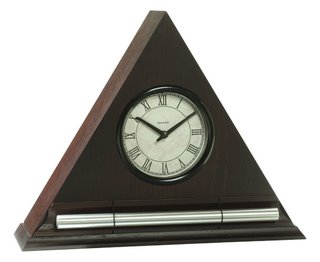 Progressive Chime Awakening - Choose the Most Natural Way to Wake Up Now & Zen – ‘The Most Natural Way to Wake Up’ Clock Shop
1638 Pearl Street
Boulder, CO 80302
(800) 779-6383
orders@now-zen.com
Posted in Bamboo Chime Clocks, sleep, Sleep Habits, zen, Zen Alarm Clock
 It's okay to nap during the day - Choose a gentle wake up - a Chime Zen Alarm Clock Have you ever felt an overpowering urge to find privacy and a bed for a midday “quickie?” Don’t feel guilty about that. It’s just your body telling you what it needs — sleep!
It’s unfortunate that most daily schedules can’t accommodate that need. Quickie naps are good for you. During the nap period of seeming inactivity, you do not simply “turn off;” complex reparative processes occur in your body. While the exact physiologic mechanisms responsible for the benefits of napping are not yet well understood, its positive outcomes have been confirmed in studies: they include improvements in mood, alertness, memory, performance and decision-making ability.
Let’s start with the best time for a nap: afternoon. An afternoon nap does not disrupt normal circadian (meaning: about a day) rhythms, whereas a morning or evening nap can — making it harder for you to return to your usual sleep routine that night. Your body probably already tells you this: circadian changes in your hormones and temperature are likely to make afternoon a naturally sleepy time for you. These cyclical patterns help explain why simply tacking more minutes or hours of sleep onto your nocturnal sleep time won’t necessarily prevent afternoon sleepiness. No matter how much you sleep at night, the afternoon urge will probably hit you.
How long should you nap? About 20 minutes. Anything much longer can backfire. You know that prolonged groggy feeling you sometimes feel after a nap? It’s called sleep inertia; you may have experienced it if you napped too long. Sleep inertia can take anywhere from 15 minutes to 4 hours to wear off. During this period, studies have shown impairments in mood, alertness, memory, performance and decision-making abilities. The likelihood of developing sleep inertia depends on several factors, one of which is the sleep stage from which you awaken. In a June, 2006 study in Sleep (the peer-reviewed publication of the Associated Professional Sleep Societies), investigators demonstrated the positive cognitive effects following 10- and 20-minute naps, but also the negative effects of sleep inertia following a 30-minute nap. The 30-minute timing coincides with the normal onset of deep sleep (also called slow-wave sleep). Limiting your nap time will help prevent entry into deep-sleep stages — avoiding sleep inertia while minimizing disruptions to your normal nocturnal sleep.
 Choose the most natural wake up -- a gentle Zen Alarm Clock with Soothing Chimes Keep in mind quickie-napping can’t compensate for significant sleep debt. While the increasing demands of our lifestyles may not reflect it, a wealth of research has verified that most adults require an average of 7 to 9 hours of sleep each night. Be mindful of persistent sleepiness throughout the day, despite adequate nocturnal sleep: it may be a symptom of a sleep disorder (such as narcolepsy, periodic limb movements, or obstructive sleep apnea) or an underlying medical problem (such as thyroid disease, serious infection or illness, anxiety or depression). Always listen to your body and speak with your doctor about your concerns.
And … try to sneak in a midday nap. But, remember, keep it quick!
Dr. Nayer Khazeni specializes in internal medicine and pulmonary/critical care, teaches, and conducts research at Stanford University Medical Center.
Waking up in the morning should be as pleasant as falling asleep at night. The Zen Alarm Clock’s gradual, gentle awakening is transformative.
Our Zen Timepiece’s acoustic 6-inch brass bowl-gong clock is the world’s ultimate alarm clock, practice timer, and “mindfulness bell.”
It fills your environment with beautifully complex tones whenever it strikes. In the morning, its exquisite sounds summon your consciousness into awakening with a series of subtle gongs that provide an elegant beginning to your day. Once you experience the Zen Timepiece’s progressive awakening, you’ll never want to wake up any other way. It also serves as the perfect meditation timer. Available in 5 wood styles, including bamboo.
adapted from sfgate.com by Nayer Khazeni, M.D.
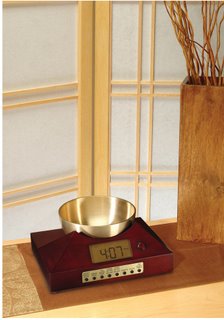 The Zen Timepiece - An acoustic 6-inch brass bowl-gong clock Now & Zen – The Bowl Gong Clock Store
1638 Pearl Street
Boulder, CO 80302
(800) 779-6383
orders@now-zen.com
Posted in sleep, Sleep Habits, wake up alarm clock, Zen Alarm Clock, Zen Timepiece by Now & Zen, Zen Timers
 Wake Up Refreshed - Choose a Z E N Alarm Clock - Utamaro Ukiyoe Wood Pipe by Yukisakuma “Waste not life,” wrote Benjamin Franklin, patron saint of American entrepreneurs. “In the grave will be sleeping enough.”
Centuries later, the attitude toward sleep in America – and in American business, in particular – has scarcely changed. Corporate culture reveres the e-mail sent at 3 a.m., the executive who rushes directly into a meeting from a red-eye flight. Bumper stickers offer an updated version of Franklin’s dictum: “I’ll sleep when I’m dead.”
“There is a cultural bias against sleep that sees it as akin to shutting down, or even to death,” explains Dr. Jeffrey Ellenbogen, a neurologist at Harvard Medical School and director of the Sleep Laboratory at Massachusetts General Hospital.
Most people, Ellenbogen says, think of the sleeping brain as similar to a computer that has “gone to sleep” – it does nothing productive. Wrong. Sleep enhances performance, learning and memory. Most unappreciated of all, sleep improves creative ability to generate “aha” moments and to uncover novel connections among seemingly unrelated ideas.
Steve Jobs, the chief executive of Apple, once defined creativity as “just connecting things.” Sleep assists the brain in flagging unrelated ideas and memories, forging connections among them that increase the odds that a creative idea or insight will surface.
While traditional stories about sleep and creativity emphasize vivid dreams hastily transcribed upon waking, recent research highlights the importance of letting ideas marinate and percolate.
“Sleep makes a unique contribution,” explains Mark Jung-Beeman, a psychologist at Northwestern University who studies the neural bases of insight and creative cognition.
Some sort of incubation period, in which a person leaves an idea for a while, is crucial to creativity. During the incubation period, sleep may help the brain process a problem.
“When you think you’re not thinking about something, you probably are,” says Jung-Beeman, who has a doctorate in experimental psychology.
 Wake up refreshed, love your alarm clock, transform your mornings with The Zen Alarm Clock's progressive awakening with gentle chimes. Another theory is that typical approaches to problem-solving may decay or weaken during sleep, enabling the brain to switch to more innovative alternatives. A classic switching story, recounted in “A Popular History of American Invention” in 1924, involves Elias Howe’s invention of the automated sewing machine: After much frustration with his original model, which used a needle with an eye in the middle, Howe dreamed that he was being attacked by painted warriors brandishing spears with holes in the sharp end. He patented a new design based on the dream spears; by the time the patent expired in 1867, he had earned more than $2 million in royalties.
Spear-wielding savages make for compelling stories, but creative insights directly induced by dreams are rare. In general, people are unaware of sleep’s effects on their performance.
Ellenbogen’s research at Harvard indicates that if an incubation period includes sleep, people are 33 percent more likely to infer connections among distantly related ideas, and yet, as he puts it, these performance enhancements exist “completely beneath the radar screen.”
 Sleep sounder - wake up refreshed - choose a natural chime alarm clock In other words, people are more creative after sleep, but they don’t know it.
This lack of awareness makes it hard to identify specific “aha” insights that have been prompted by sleep.
“It’s more that sleep brings a change of approach,” explains Mark Holmes, an art director at Pixar Animation Studios who worked on the film “WallE.” “You can get tunnel vision when you’re hammering away at a problem. You keep going down this same path, again and again, just tweaking, making incremental changes at best. ” He continues: “Sleep erases that. It resets you. You wake up and realize – wait a minute! – there is another way to do this.”
Business attitudes toward sleep may be starting to shift. Claire Stapleton, a spokeswoman for Google, says grassroots interest in sleep led to an on-campus talk by Sara Mednick, a napping expert. Google also installed EnergyPods, leather recliners with egglike hoods that block noise and light, for employees to take naps at work.
Other companies that have installed EnergyPods include Cisco Systems and Procter & Gamble.
Vinayak Sudame, an engineer at the Research Triangle Park campus of Cisco, says he uses an EnergyPod to “shut my eyes and shut myself off for 10 or 15 minutes” when he is working on a problem or needs some quiet time. More than a walk or a coffee break, he says, this type of “total mental rest” helps him return to work with a reorganized perspective.
Alertness Solutions, a sleep consulting company in Cupertino, provided consultations and recommendations to several U.S. Olympic teams before the Beijing Games and also works with corporate clients. Bob Agostino, vice president of operations at L.J. Aviation, in Latrobe, Pa., worked with Alertness Solutions at a previous employer and says that employees learned specific strategies to improve performance. These included when and how long to nap, how to determine the amount of sleep one needs, and how to recognize signs of fatigue and symptoms of sleep disorders.
Acting on this knowledge, Agostino says, “gives you an edge.”
In general, West Coast companies are more concerned about sleep issues than their East Coast counterparts, says Arshad Chowdhury, co-founder and chief executive of MetroNaps, which developed the EnergyPods.
“Particularly in New York, where financial services play such a big role, people are consistently sleep-deprived and consistently in denial,” he says.
Chowdhury – who says the idea for EnergyPods came to him in a nap – recalls a seminar in which one banker responded to a survey question with a note saying she knew she had no fatigue-related problems at work because the only time she fell asleep was when she sat still. Chowdhury laughs a bit ruefully: “Maybe we could have avoided the crisis we are in now if these people had just gotten proper sleep.”
Wake up with gradual, beautiful acoustic chimes. The Zen Alarm Clock transforms your mornings and gets you started right, with a progressive awakening.
Our Bamboo Digital Zen Clock’s long-resonating Tibetan bell-like chime makes waking up a beautiful experience – its progressive chimes begin your day with grace. When the clock’s alarm is triggered, the acoustic chime bar is struck just once … 3-1/2 minutes later it strikes again … chime strikes become more frequent over 10 minutes … eventually striking every 5 seconds until shut off. As they become more frequent, the gentle chimes will always wake you up – your body really doesn’t need to be awakened harshly, with a Zen Clock you’re awakened more gradually and thus more naturally. Unlike artificial recorded sounds coming out of a tiny speaker in a plastic box, natural acoustic sounds transform your bedroom or office environment.
adapted from sfgate.com by Leslie Berlin
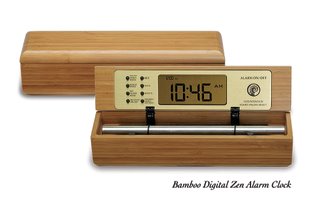 Wake Up The Most Natural Way -- Choose a Gentle Chime Alarm Clock Now & Zen – The Chime Alarm Clock Shop
1638 Pearl Street
Boulder, CO 80302
(800) 779-6383
orders@now-zen.com
Posted in Bamboo Chime Clocks, Chime Alarm Clocks, Now & Zen Alarm Clocks, sleep, Sleep Habits
 What is keeping you awake? Eliminate clutter...Eisui If you are having trouble sleeping, your bedroom could be to blame.
Too many people clutter their sleep environment with reminders of daytime responsibilities: a desk piled with bills, a computer with e-mail, a fax machine, a telephone . . .
Combine that with an increase in street noise and outside light filtering in from streetlights and outdoor security systems. It’s no wonder insomnia caused by environmental factors is on the rise.
The good news is the sleep environment is controllable and, with some attention to details, you can design a good night’s sleep.
As many as 43 percent of American adults suffer from insomnia, according to this year’s National Sleep Foundation Gallup poll. If you cannot identify a cause for your sleeplessness, specialists advise taking inventory of your sleep environment. Identify what may be sabotaging your sleep in the bedroom and redesign that space.
SLEEP, NOT WORK
In today’s houses where space is at a premium, many rooms must do double duty. Often, the bedroom also functions as a home office or a private area for parents with a TV set. All this equipment, experts say, is not conducive to sleep.
“People are clueless when it comes to designing their bedrooms for their fundamental purposes — sleep and sex — yet wonder why they have insomnia when their rooms are filled with so many distractions,” explains Al Reichert, technical supervisor of the Sequoia Sleep Disorders Center in Redwood City.
“Some people have virtual offices in their bedrooms — computers, e- mail, faxes, telephone — and then can’t figure out why they can’t sleep,” remarks Reichert.
 Choose a peaceful wake up - The Z E N Alarm Clock - the only clock with natural sounds The body actually has a physiological response to its environment, experts say. But since people aren’t usually aware of this response, linking work space in the bedroom with sleeping problems may be difficult.
“Any activity that is associated with being awake in the bedroom, like work, can be a problem,” explains Dr. Jerrold Kram of the California Center for Sleep Disorders in Oakland.
“It is an even more extreme problem for people who work in bed — answering the phone, reading important papers, studying and taking notes,” says Kram. “Their body becomes ingrained with being awake in bed, and any awake activity — defined as an activity that requires alertness — is not what you want to perpetuate in an environment intended for sleep.”
If space constraints preclude emptying the bedroom of work-related paraphernalia, consider separating work and sleep spaces in the room. A freestanding partition or decorative screen can enclose the bed for a cozy sleep environment. Adding a sleeping loft above the work space for the bed can also distinguish working and sleeping spaces.
QUIET, PLEASE
Environmental noise is a huge issue, especially for people who must sleep during the day because of work schedules. But noise can even affect the quality of sleep for those who sleep at night — especially if they live on a busy street, near an airport or train station, or with a snoring bedmate.
“When I started in this business of sleep disorders, it didn’t dawn on me that people can get accustomed to noise, and not recognize that it can still be disruptive or problematic,” says Kram. “Someone will come in and say, ‘I sleep badly; I wake up a lot,’ but have no idea what woke them.”
Kram relates studies in which a bell was rung every two or three minutes near sleeping patients.
“When the patient was asked in the morning if they remembered the bell ringing, they responded, `What? Are you out of your mind? There was no bell!’
“But when we examined their brain waves, they had had an awakening or arousal for a few seconds every three minutes. These arousals cause fragmented sleep and result in sleep deprivation.”
Fragmented sleep can result in an achy feeling, lack of concentration and mental fatigue the next day.
White noise neutralizes jarring, intermittent sounds. Installing a fan or air conditioner in the room not only provides white noise but also controls the temperature for comfortable sleep.
Another option is to purchase a white noise generator that emits a broad spectrum of sound at a constant volume. Some generators replicate the pleasing sounds of an ocean or steady rain and mask unwanted noise.
“Eventually, you will habituate to this white noise, and disruptive environmental noise will become less of a factor,” Reichert explains.
Sleep specialists also recommend aids such as “industrial strength” earplugs fitted by a doctor, or earphones attached to white noise generators, especially if a snoring bedmate is causing the noise pollution.
To clients who are remodeling their bedrooms, Kram often recommends adding extra insulation to rooms and changing to soundproof windows. And it may be necessary to cover hardwood floors and replace light and airy window shades with heavy, noise-absorbing draperies.
LIGHTS OUT
Light filtering through window shades may provide a warm glow to a room, but artificial or natural light exposure may also rob people of sleep. Blackout shades are a must for those who sleep during the day. But those bothered by errant light at night also should consider them.
“Light is a powerful cue that resets the body’s circadian rhythm and tells it to wake up,” explains Audrey Chang of the Better Sleep Council of Washington, D.C. The council reports findings from a recent study that show exposure to even moderate levels of light at night — such as artificial light — can throw off the body’s internal clock and cause a state similar to jet lag.
“For many people, you can’t even have a streetlight down your block filtering in,” says Darlene Sanders, former designer of sleep labs and now a representative for Roc-lon TLC, a manufacturer of blackout draperies based in Baltimore, Md.
Blackout draperies have come a long way from the vinyl-coated drapery liners of years past. All-in- one fabrics produced with a heat transfer process on polyester-and- cotton-base cloth feature patterns resembling fabrics from silk moire to denim. Hidden magnetic closures in the seams provide total light control.
COLOR CONSCIOUS
Bright reds, hot oranges and intense yellows are probably not the best colors for a sleep environment, says interior designer Paula McChesney of San Mateo. But the conventional bedroom colors of muted blues and soft greens will not work for everyone, either.
“There is a distinct part of our brain that relates to color memory, much like certain smells help us recall something from the past,” explains McChesney. The designer, who has had careers in both health care and interior design, has focused much of her work on exploring how color affects people.
“If Grandma’s home was in shades of blue and you were unhappy there, chances are blues won’t relax you now,” she says.
Hue and intensity are also important.
“Some people would find a midnight blue cozy and good to sleep in, but for me it would be claustrophobic. I would like a turquoise blue that reminds me of the Caribbean,” McChesney says.
For a relaxing environment, she says, avoid high contrast, such black and white, and patterns such as bold stripes or diagonals that excite the eye.
The best bedroom design for sleep ultimately comes down to what the National Sleep Foundation calls the three basics: cool, dark and quiet.
One of the ultimate Zen like experiences is waking-up from a great slumber refreshed and energized. Your mind and body are harmoniously one, both alert and focused. Having a refreshed mind and body are two keys to a natural and Zen lifestyle. Waking up in the morning should not be a loud and abrupt awakening, but rather it should be a peaceful positive experience. The right natural alarm clock can transition your deep and tranquil sleep into a serene start to consciousness. Imagine a long-resonating Tibetan bell-like chime waking you up to a beautiful morning experience.
The right alarm clock can be the most beneficial investment for you. With our Now & Zen natural alarm clock you are awakened more gradually and thus more naturally. Now & Zen is focused on creating a naturalistic lifestyle, and our clocks are an example of our philosophy.
adapted from sfgate.com by Gail Benchener
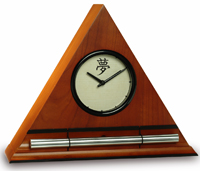 Natural Sounding Alarm Clocks -- Vibrating Chime Bar Wakes You Gently Now & Zen – The Most Natural Awakening – Slow & Gentle
The Z E N Alarm Clock Store
1638 Pearl Street
Boulder, CO 80302
(800) 779-6383
orders@now-zen.com
Posted in Bamboo Chime Clocks, Natural Awakening, sleep, Sleep Habits
 How to choose a great alarm clock with natural sounds - Visit Now & Zen, Inc. - Boulder, CO The next time you think about studying all night with your face in a book, think about this: Your brain will work better if you sleep on that book instead.
Shut-eye may be a good performance-boosting strategy, according to a new study presented at the Society for Neuroscience Conference in Atlanta.
Scientists from Harvard University studied nearly 100 college students to find out whether sleep can improve memory.
They divided the students into two groups and told each student to memorize several lists of related words — such as bed, sheet, and pillow or sill, glass, and pane — as they were read aloud.
The first group tried to memorize the lists at 9 a.m. while the second group tried to memorize the lists at 9 p.m.
The memory test came 12 hours after the students had first heard the words.
So, daytime learners were tested at 9 p.m. while night learners were tested at 9 a.m.
But the students who first learned the words during the evening got a good night’s rest before facing their memory test the next morning.
Each group was asked to write down all the words that they could remember. Researchers found that the students who studied the lists at 9 p.m. and got some sleep remembered more words than the students who were tested after staying awake throughout the day.
The Phenomenon of Remembering Incorrectly
However, the students who got some sleep also recalled some words that were not on the lists.
From a list of words including bed, sheet and pillow, a student may incorrectly remember the word “sleep” or form a false memory for the word “window” in a list including sill, glass and pane.
The students were remembering words that were associated with the ones that they had actually heard.
Scientists call this phenomenon of incorrectly remembering something that didn’t happen a “false memory.”
False memories are not all that unusual. It’s similar to a feeling you have when you think you’re sure that something happened — until someone proves you wrong.
Then you realize that your false memory was just an idea very closely related to something that happened in reality.
Sleep Plays a Role in False Memories
The students who snoozed before testing had more of these false memories than their friends who did not sleep.
This is the first time scientists have seen that sleep plays a role in false memories — and researchers are excited about the discovery.
The finding suggests that the brain is hardly asleep when the rest of the body is.
“Sleep is not a passive state where we lay around and lose productivity, but an active process during which the brain is integrating information,” said Dr. Christoph Nissen, sleep researcher and postdoctoral fellow at the Western Psychiatric Institute in Pittsburgh.
According to this study, the brain is engaged in a sort of wordplay while the body is asleep.
 sleep improve ones memory This finding suggests that a learning process occurs during sleep that has a lot to do with language and what words mean, says Dr. Lawrence Epstein, past president of the American Academy of Sleep Medicine, and medical director of Sleep Health Centers in Boston.
Our brain forms links between our memories for these words to help us store information in a way that is meaningful to us.
During sleep, “our brain is writing a summary,” said Dr. Robert Stickgold, study author and associate professor of psychiatry at Harvard Medical School and Beth Israel Deaconess Medical Center.
When the brain awakes, it may recall words from this summary even though those words weren’t part of the original exercise.
Forget the All-Nighters
Sleep may do interesting things to our memories, but not sleeping can wreak havoc on the brain and on the body.
Experts say that getting enough sleep is vital to our overall health.
It plays a role in immune function, emotional regulation, and other processes like the ability to concentrate.
There’s no substitute for serious studying, but a good night’s sleep may prove to be more helpful than scientists previously thought.
“People who study and then sleep recall things better than people who stay up all night studying,” Epstein said.
Boulder, Colorado—an innovative company has taken one of life’s most unpleasant experiences (being startled awake by your alarm clock early Monday morning), and transformed it into something to actually look forward to. “The Zen Alarm Clock,” uses soothing acoustic chimes that awaken users gently and gradually, making waking up a real pleasure.
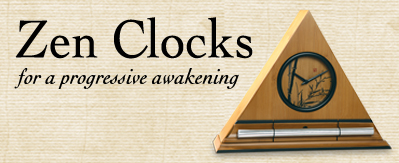 Get help choosing a different alarm clock -- Visit our store - Now & Zen, Inc. - Boulder, CO Rather than an artificial recorded sound played through a speaker, the Zen Clock features an alloy chime bar similar to a wind chime. When the clock’s alarm is triggered, its chime produces a long-resonating, beautiful acoustic tone reminiscent of a temple gong. Then, as the ring tone gradually fades away, the clock remains silent until it automatically strikes again three minutes later. The frequency of the chime strikes gradually increase over ten-minutes, eventually striking every five seconds, so they are guaranteed to wake up even the heaviest sleeper. This gentle, ten-minute “progressive awakening” leaves users feeling less groggy, and even helps with dream recall.
adapted from abcnews.go.com by LISA PHILIPOSE
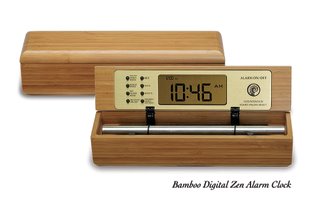 Choose the right alarm clocks for a refreshed mood in the morning - Visit Now & Zen, Inc - Boulder, CO Now & Zen – The Alternative Alarm Clock Shop
1638 Pearl Street
Boulder, CO 80302
(800) 779-6383
Posted in Bamboo Chime Clocks, Natural Awakening, Now & Zen Alarm Clocks, sleep, Sleep Habits, Zen Alarm Clock
« Previous Page — « Previous Entries
Next Entries » — Next Page »
|
|
|
|